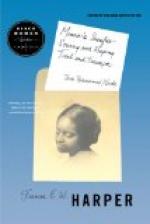“What hinders?” said Rev. Lomax.
“I will not say what hinders, but I will say what I think you can try to do to help. Teach our young to dedicate their young lives to the noble service of devoting them to the service of our common cause; to throw away their cigars, dash down the foaming beer and sparkling wine and strive to be more like those of whom it was said, ’I write unto you, young men, because you are strong.’”
Chapter XIV
Grandmother Harcourt was failing. Annette was rising towards life’s summit. Her grandmother was sinking to death’s vale.
The hours are rifting day by day
Strength from the walls of living clay.
Her two children who were living in A.P. wished her to break up her home and come and live with them. They had room in their hearts and homes for her, but not for Annette. There was something in Annette’s temperament with which other members of the family could not harmonize. They were not considerate enough to take into account her antenatal history, and to pity where they were so ready to condemn. Had Annette been born deficient in any of her bodily organs, they could have made allowance for her, and would have deemed it cruel to have demanded that she should have performed the same amount of labor with one hand that she could have done with both. They knew nothing of heredity, except its effects, which they were not thoughtful enough to trace back to the causes over which Annette had no control, and instead of trying to counteract them as one might strive to do in a case of inherited physical tendencies, they only aggravated, and constantly strengthened all the unlovely features in Annette’s character, and Annette really seemed like an anomalous contradiction. There was a duality about her nature as if the blood of two races were mingling in her veins. To some persons Annette was loving and love-able, bright, intelligent, obliging and companionable; to others, unsociable, unamiable and repelling. Her heart was like a harp which sent out its harmonious discords in accordance with the moods of the player who touched its chords. To some who swept them it gave out tender and touching melody, to others its harshest and saddest discords. Did not the Psalmist look beneath the mechanism of the body to the constitution of the soul when he said that “We are fearfully and wonderfully made?”




